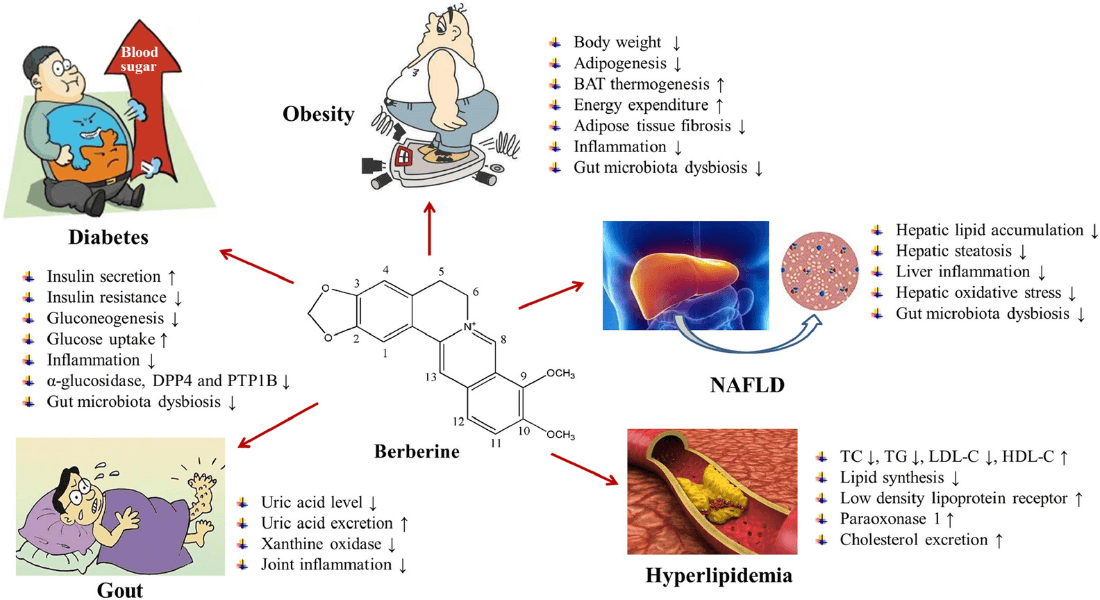Key Takeaways:
- Berberine is a compound with a history in traditional Chinese medicine, now recognized for its potential to manage various health conditions.
- Scientific studies suggest that berberine may help lower blood glucose, manage high blood pressure, and improve obesity-related issues.
- While berberine shows promise, it should be used with caution and under medical supervision, especially when combined with prescription medications.
Berberine is a bioactive compound extracted from several different plants, including a group known as Berberis. Traditionally, it has been used in Chinese and Ayurvedic medicine for centuries.
With the advent of modern research, the scope of berberine's potential health benefits has expanded, making it a subject of interest for scientists and health enthusiasts alike.
What Exactly Is Berberine?
Berberine is a compound found in plants such as tree turmeric, Oregon grape, and goldenseal.
It's known for its yellow color and has been used to dye wool, leather, and wood. In the realm of health, berberine is available in powder or capsule form and is often taken as a supplement.

Traditional Uses in Medicine
Historically, berberine has been used in traditional Chinese medicine and Ayurveda for its antimicrobial properties and to treat a variety of ailments.
Its use in these ancient practices has laid the foundation for its modern-day examination and application.
Berberine and Blood Glucose Control
One of the most researched benefits of berberine is its ability to lower blood glucose levels. Studies have found that berberine lowers blood sugar by increasing insulin receptor expression and improving insulin sensitivity, which are crucial for those with diabetes.
Berberine's Role in Managing Diabetes
Berberine may act similarly to some diabetes medications, making it a potential natural alternative for managing the condition. Randomized controlled trials have shown that taking berberine can lead to significant reductions in blood sugar levels in individuals with type 2 diabetes.
Impact on High Blood Pressure
High blood pressure is a risk factor for many chronic diseases. Berberine supplements have been studied for their potential to lower blood pressure, possibly through improving blood flow and reducing arterial stiffness.
Berberine and Heart Health
Coronary heart disease is a major concern worldwide, and managing risk factors like high cholesterol is vital. Berberine has been found to have a lipid-lowering effect, which may contribute to better heart health.
Addressing Metabolic Syndrome
Metabolic syndrome is a cluster of conditions that increase the risk of heart disease and diabetes. Berberine may help manage metabolic syndrome by improving factors such as body mass index (BMI), insulin resistance, and lipid metabolism.

Berberine and Weight Management
Obesity is a growing concern globally, and berberine has been studied for its potential to induce significant weight loss and improve obesity parameters by influencing fat cells and promoting beneficial metabolic effects.
Berberine's Effects on Polycystic Ovary Syndrome (PCOS)
PCOS is a common condition affecting women of reproductive age. Berberine may help manage PCOS by reducing insulin resistance and aiding in weight management, which are key aspects of the condition.
Berberine for Gastrointestinal Health
Irritable bowel syndrome (IBS) can be a debilitating condition. Berberine's antimicrobial properties may help alleviate some symptoms of IBS, although more research is needed in this area.
Berberine and Liver Health
Liver function enzymes are indicators of liver health. Berberine supplementation has been associated with improvements in these enzymes, suggesting a potential protective effect on the liver.
Berberine's Interaction with Medications
While berberine has many potential health benefits, it's important to note that it can interact with various prescription medications, including blood sugar lowering drugs, blood pressure medications, and cholesterol lowering drugs.
Berberine and Blood Clotting
For individuals on blood clotting medications, berberine may enhance the effects of these drugs, which could increase the risk of bleeding. It's crucial to consult with a healthcare provider before taking berberine in such cases.
Berberine's Influence on AMP Activated Protein Kinase
AMP activated protein kinase (AMPK) is an enzyme that plays a role in cellular energy homeostasis. Berberine activates AMPK, which is thought to contribute to its various health benefits, including lowering blood sugar and lipid levels.
Berberine's Mechanism in Lipid Regulation
Berberine has been spotlighted in numerous studies for its lipid-lowering effect, which is a boon for those managing high cholesterol levels.
The compound is believed to function by up regulating the expression of low-density lipoprotein receptors in the liver, thereby enhancing the clearance of LDL cholesterol from the bloodstream.
This action not only helps in treating high cholesterol but also contributes to overall cardiovascular health.
Animal studies suggest that berberine can significantly reduce serum cholesterol and triglyceride levels, hinting at its potential as a natural alternative to conventional lipid-lowering medications.
In human subjects, the effects of berberine on lipid profiles have been promising. Randomized clinical trials have shown that berberine supplementation can lead to a notable reduction in total cholesterol, LDL cholesterol, and triglycerides.
These findings are particularly important for individuals with dyslipidemia, a condition characterized by abnormal lipid levels in the blood, which is a common comorbidity of diabetes.
By incorporating berberine into their regimen, patients may experience a dual benefit: better blood sugar control and improved lipid levels, making it a multifaceted ally in metabolic health.
Berberine's Cognitive benefits the conversation around berberine often centers on its metabolic and cardiovascular benefits, but recent studies suggest that its advantages may extend to cognitive health as well.
Berberine's potential to support brain function is an exciting frontier in natural health research.
Preliminary findings indicate that berberine may help protect against age-related cognitive decline, offering a beacon of hope for individuals seeking to maintain mental acuity as they age.
Moreover, the neuroprotective properties of berberine could be linked to its anti-inflammatory and antioxidant effects.
Chronic inflammation and oxidative stress are known contributors to cognitive disorders, and berberine's ability to mitigate these processes might explain its positive impact on brain health.
While berberine lowers blood glucose and has a lipid-lowering effect, these actions may also benefit cognitive function, as metabolic health is closely tied to brain health.
Enhancing Athletic Performance with Berberine Athletes and fitness enthusiasts are always on the lookout for natural supplements that can enhance performance and recovery.
Berberine supplement options have emerged as a promising aid, not just for their well-documented health benefits but also for their potential to improve exercise outcomes.
Berberine's role in energy metabolism could make it a valuable addition to an athlete's regimen, potentially enhancing endurance and reducing fatigue during prolonged physical activity.
The lipid-lowering effect of berberine may also play a role in athletic performance. By improving lipid metabolism, berberine can help maintain optimal body composition and support cardiovascular health, both of which are crucial for high-level performance.
As research continues to uncover the diverse benefits of berberine, its adoption in sports nutrition could see a significant increase, provided that further studies confirm its efficacy in this domain.
Berberine in the Spotlight of Diabetes Management
As a diabetes drug, berberine has garnered attention for its ability to treat diabetes by lowering blood glucose levels.
Its mechanism is multifaceted, involving the enhancement of insulin sensitivity, promotion of glucose uptake by cells, and reduction of glucose production in the liver.
These actions make berberine a valuable supplement for those looking to lower blood sugar levels and manage their diabetes more effectively.
The interest in berberine what is it used for in diabetes management has surged, as it offers a natural approach that complements existing pharmacological treatments.
The efficacy of berberine in diabetes care has been substantiated through randomized clinical trials, where berberine hydrochloride has been tested against placebo and other diabetes medications.
The results have been encouraging, showing that berberine can effectively reduce fasting blood glucose and postprandial blood glucose levels.
Moreover, when used in conjunction with lifestyle changes, such as diet and exercise, berberine's impact on blood sugar control is even more pronounced.
This evidence positions berberine as a potent supplement that could revolutionize the way we treat diabetes and associated metabolic disorders.
Berberine and Cholesterol Management
Cholesterol is a waxy substance found in your blood, essential for building healthy cells. However, high levels of cholesterol can increase the risk of heart disease.
When cholesterol levels are elevated, fatty deposits can develop in blood vessels, making it hard for enough blood to flow through arteries, leading to complications such as heart attack and stroke.
Berberine, a compound extracted from various plants, has been used in traditional Chinese medicine for centuries.
Recent research has highlighted its potential in managing cholesterol levels, making it a subject of interest for those seeking natural health solutions.
The Science Behind Berberine
Berberine works by inhibiting an enzyme called PCSK9, which leads to increased removal of low-density lipoprotein (LDL), commonly known as bad cholesterol, from the bloodstream.
Additionally, berberine activates AMP-activated protein kinase (AMPK), an enzyme that plays a role in regulating lipid metabolism. This dual action makes berberine a promising agent in cholesterol management.
Clinical studies have shown that berberine can significantly reduce serum cholesterol levels, particularly LDL cholesterol and triglycerides, without causing serious side effects.
This makes it an attractive option for individuals who are either unable to tolerate statins or prefer a more natural approach.
Berberine's Role in Reducing Triglyceride Levels
Triglycerides are another type of fat found in the blood, and high levels can also contribute to heart disease. Berberine has been shown to lower triglyceride levels by improving insulin resistance and enhancing the breakdown of fats.
Studies have reported that berberine can lead to a reduction in triglycerides of approximately 35-45%.
This impressive effect on triglycerides, combined with its cholesterol-lowering abilities, positions berberine as a comprehensive natural treatment for improving lipid profiles.
Berberine's Potential in Cancer Research
Emerging research suggests that berberine may have anti-cancer properties. However, this research is still in its early stages, and berberine should not be considered a treatment for cancer at this time.
Berberine and Its Antimicrobial Effects
The antimicrobial properties of berberine have been recognized for centuries. It has been used to fight infections caused by bacteria, viruses, fungi, and parasites.
Berberine's Safety Profile
While berberine is generally considered safe for most people, it can cause side effects such as digestive discomfort. It's important to start with a lower dose and monitor your body's response.
Berberine and Pregnancy
Pregnant women should exercise caution with berberine, as it may cross the placenta and could be found in breast milk. The effects of berberine on a developing fetus or nursing infant are not well understood.
Berberine's Impact on Blood Sugar Levels
For individuals with diabetes or those at risk of low blood sugar, monitoring blood sugar levels while taking berberine is essential to avoid hypoglycemia.
Berberine as Part of a Healthy Lifestyle
While berberine can be beneficial, it should not replace other important aspects of health management, such as diet and exercise. It's best used as part of a comprehensive approach to health.
The Future of Berberine Research
As interest in berberine grows, more research is being conducted to fully understand its effects. Future studies may reveal additional health benefits and clarify the best ways to use berberine.
Berberine's Role in Treating Common Metabolic Diseases
Given its potential impact on blood sugar, cholesterol, and body weight, berberine could play a role in treating common metabolic diseases, but it should be used under medical supervision.
Berberine and Lifestyle Changes
For those looking to improve their health, incorporating berberine with lifestyle changes like a balanced diet and regular exercise may enhance overall well-being.
Berberine in Dietary Supplements
Berberine is commonly found in dietary supplements, often combined with other compounds that may synergistically enhance its effects.
Human Studies on Berberine
Human studies on berberine have provided valuable insights into its potential health benefits, but more research is needed to establish definitive conclusions.
The Need for More Research on Berberine
While the existing research on berberine is promising, the scientific community agrees that more research is necessary to fully understand its mechanisms and long-term effects.
Final Thoughts
Berberine is a compound with a rich history in traditional medicine and a growing body of scientific research supporting its potential health benefits.
It has been shown to help manage blood glucose levels, high blood pressure, and various aspects of metabolic syndrome, among other health concerns.
However, it's important to use berberine responsibly, especially in conjunction with prescription medications, and under the guidance of a healthcare provider.
As research continues, we may discover even more ways in which berberine can contribute to health and wellness.
FAQ Section
Q: Can berberine replace my diabetes medication?
A: While berberine has been shown to have blood sugar-lowering effects, it should not replace your prescribed diabetes medication without consulting your healthcare provider. It may be used as an adjunct therapy under medical supervision.
Q: Is berberine safe to take with high blood pressure medications?
A: Berberine may interact with blood pressure medications, so it's important to consult with your healthcare provider before combining the two to ensure safe and effective use.
Q: How long does it take for berberine to show effects on health?
A: The time it takes for berberine to exert its effects can vary depending on the individual and the health condition being addressed.
Some studies suggest improvements can be seen within a few weeks, but it's best to discuss expectations with a healthcare provider.








